something,anything, everything
- 格式:doc
- 大小:20.00 KB
- 文档页数:1
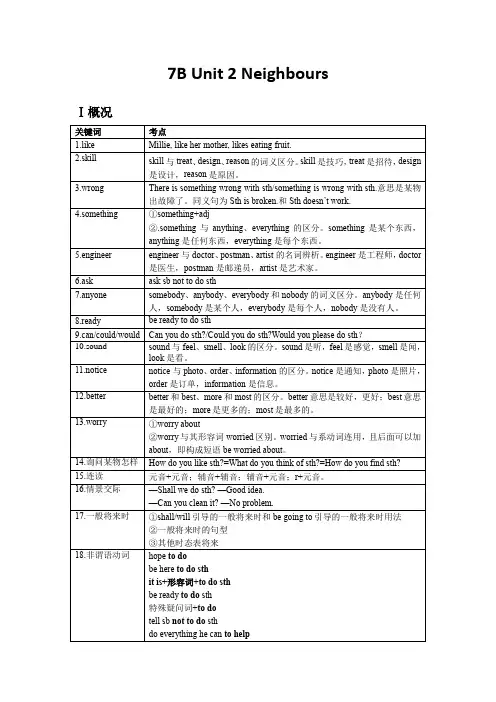
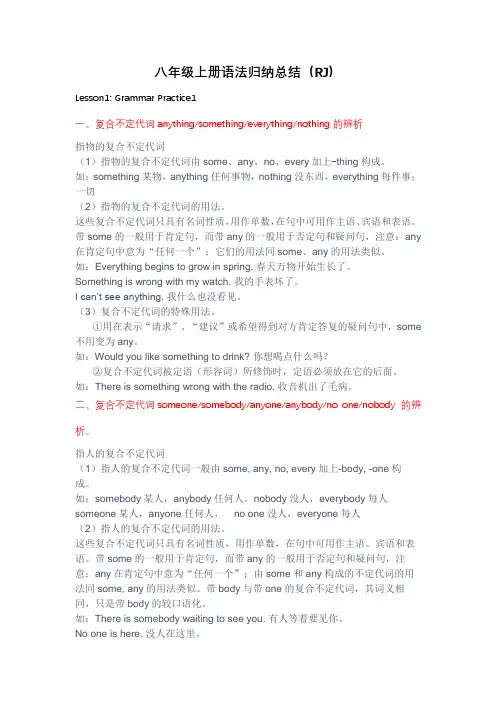
八年级上册语法归纳总结(RJ)Lesson1: Grammar Practice1一、复合不定代词anything/something/everything/nothing的辨析指物的复合不定代词(1)指物的复合不定代词由some、any、no、every加上-thing构成。
如:something某物,anything任何事物,nothing没东西,everything每件事;一切(2)指物的复合不定代词的用法。
这些复合不定代词只具有名词性质,用作单数,在句中可用作主语、宾语和表语。
带some的一般用于肯定句,而带any的一般用于否定句和疑问句,注意:any 在肯定句中意为“任何一个”;它们的用法同some、any的用法类似。
如:Everything begins to grow in spring. 春天万物开始生长了。
Something is wrong with my watch. 我的手表坏了。
I can’t see anything.我什么也没看见。
(3)复合不定代词的特殊用法。
①用在表示“请求”、“建议”或希望得到对方肯定答复的疑问句中,some 不用变为any。
如:Would you like something to drink? 你想喝点什么吗?②复合不定代词被定语(形容词)所修饰时,定语必须放在它的后面。
如:There is something wrong with the radio. 收音机出了毛病。
二、复合不定代词someone /somebody/anyone/anybody/no one/nobody的辨析。
指人的复合不定代词(1)指人的复合不定代词一般由some, any, no, every加上-body, -one构成。
如:somebody某人,anybody任何人,nobody没人,everybody每人someone某人,anyone任何人,no one没人,everyone每人(2)指人的复合不定代词的用法。
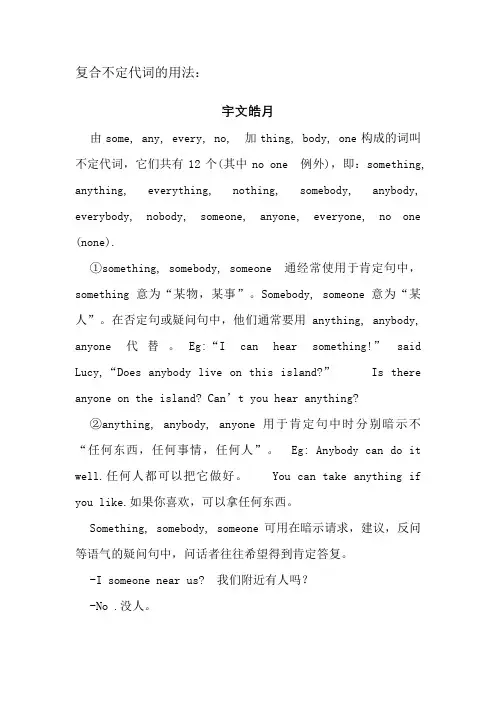
复合不定代词的用法:宇文皓月由some, any, every, no, 加thing, body, one构成的词叫不定代词,它们共有12个(其中no one 例外),即:something, anything, everything, nothing, somebody, anybody, everybody, nobody, someone, anyone, everyone, no one (none).①something, somebody, someone通经常使用于肯定句中,something意为“某物,某事”。
Somebody, someone意为“某人”。
在否定句或疑问句中,他们通常要用anything, anybody, anyone代替。
Eg:“I can hear something!”said Lucy,“Does anybody live on this island?”Is there anyone on the island? Can’t you hear anything?②anything, anybody, anyone用于肯定句中时分别暗示不“任何东西,任何事情,任何人”。
Eg: Anybody can do it well.任何人都可以把它做好。
You can take anything if you like.如果你喜欢,可以拿任何东西。
Something, somebody, someone可用在暗示请求,建议,反问等语气的疑问句中,问话者往往希望得到肯定答复。
-I someone near us? 我们附近有人吗?-No .没人。
-Would you like something to drink? 你想要些喝的东西吗?-Yes, please.是的。
③nothing, nobody通经常使用于肯定句中,暗示否定的意思。
Nothing意为“没有什么事情,没有东西”,nobody意为“没有人”。
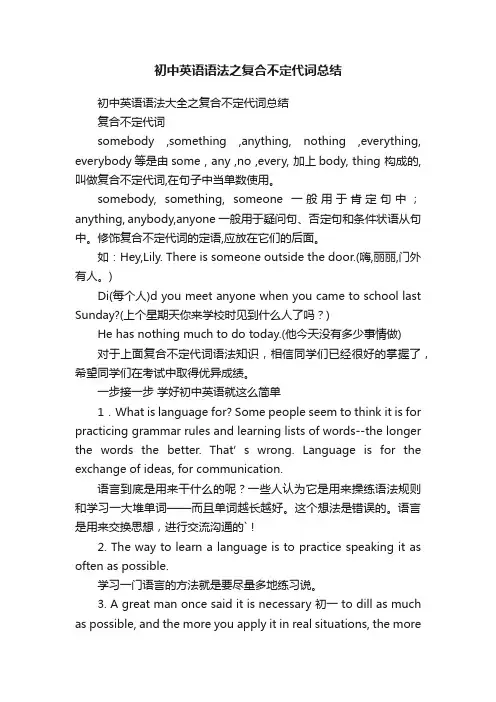
初中英语语法之复合不定代词总结初中英语语法大全之复合不定代词总结复合不定代词somebody ,something ,anything, nothing ,everything, everybody等是由some , any ,no ,every, 加上body, thing 构成的,叫做复合不定代词,在句子中当单数使用。
somebody, something, someone 一般用于肯定句中;anything, anybody,anyone一般用于疑问句、否定句和条件状语从句中。
修饰复合不定代词的定语,应放在它们的后面。
如:Hey,Lily. There is someone outside the door.(嗨,丽丽,门外有人。
)Di(每个人)d you meet anyone when you came to school last Sunday?(上个星期天你来学校时见到什么人了吗?)He has nothing much to do today.(他今天没有多少事情做)对于上面复合不定代词语法知识,相信同学们已经很好的掌握了,希望同学们在考试中取得优异成绩。
一步接一步学好初中英语就这么简单1.What is language for? Some people seem to think it is for practicing grammar rules and learning lists of words--the longer the words the better. That’s wron g. Language is for the exchange of ideas, for communication.语言到底是用来干什么的呢?一些人认为它是用来操练语法规则和学习一大堆单词——而且单词越长越好。
这个想法是错误的。
语言是用来交换思想,进行交流沟通的`!2. The way to learn a language is to practice speaking it as often as possible.学习一门语言的方法就是要尽量多地练习说。
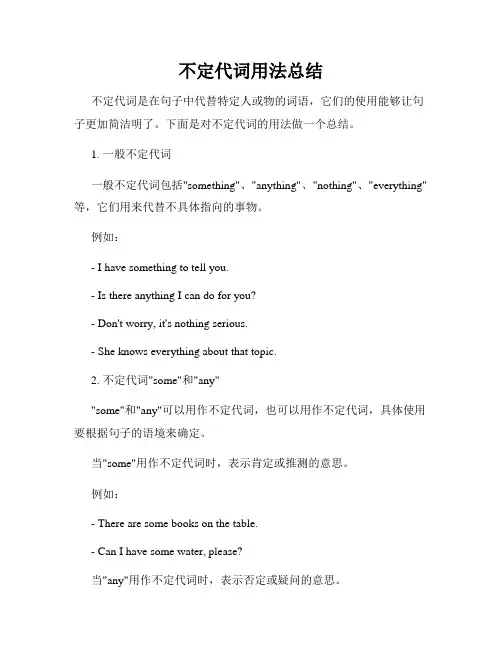
不定代词用法总结不定代词是在句子中代替特定人或物的词语,它们的使用能够让句子更加简洁明了。
下面是对不定代词的用法做一个总结。
1. 一般不定代词一般不定代词包括"something"、"anything"、"nothing"、"everything"等,它们用来代替不具体指向的事物。
例如:- I have something to tell you.- Is there anything I can do for you?- Don't worry, it's nothing serious.- She knows everything about that topic.2. 不定代词"some"和"any""some"和"any"可以用作不定代词,也可以用作不定代词,具体使用要根据句子的语境来确定。
当"some"用作不定代词时,表示肯定或推测的意思。
例如:- There are some books on the table.- Can I have some water, please?当"any"用作不定代词时,表示否定或疑问的意思。
- I don't have any money with me.- Do you have any ideas for the project?3. 不定代词"somebody"、"anybody"、"nobody"和"everybody"这些不定代词用来代替人。
它们的使用方式类似于前面提到的一般不定代词。
例如:- Somebody is waiting for you outside.- Nobody knows the answer.- Can anybody help me with this problem?- Everybody enjoyed the party.4. 不定代词"each"和"every""each"和"every"用来代替三者或多者中的每一个。
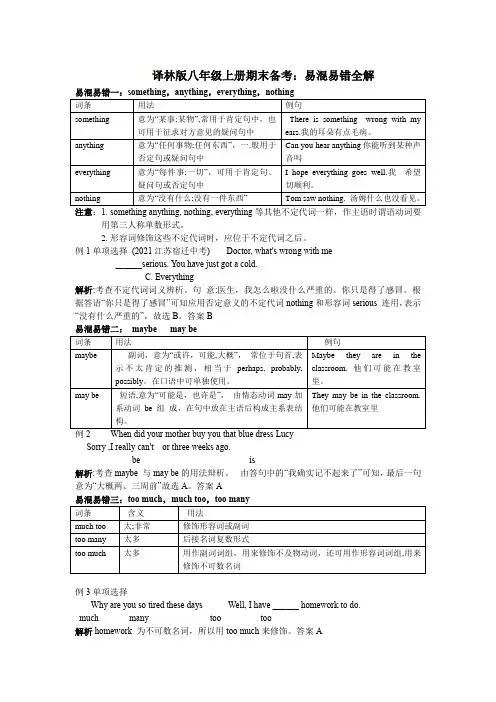
译林版八年级上册期末备考:易混易错全解注意:1. something anything, nothing, everything 等其他不定代词一样,作主语时谓语动词要用第三人称单数形式。
2. 形容词修饰这些不定代词时,应位于不定代词之后。
例1单项选择 (2021江苏宿迁中考)----- Doctor, what's wrong with me -----______serious. You have just got a cold. C. Everything解析:考查不定代词词义辨析。
句 意:医生,我怎么啦没什么严重的。
你只是得了感冒。
根据答语“你只是得了感冒”可知应用否定意义的不定代词nothing 和形容词serious 连用,表示“没有什么严重的”,故选B 。
答案B----Sorry ,I really can't or three weeks ago.be is 解析:考查maybe 与may be 的用法辩析。
由答句中的“我确实记不起来了”可知,最后一句意为“大概两、三周前”故选A 。
答案A例3单项选择----Why are you so tired these days ----- Well, I have ______ homework to do. much many too too解析homework 为不可数名词,所以用too much 来修饰。
答案A易混易错四:voice, sound ,noise例4 单项选择----Listen! Who is singing----It's Betty. She has a sweet_________.B. voice解析句意听!谁在唱歌一_是Betty在唱歌。
她有甜美的嗓音。
sound 泛指一切声音;voice 嗓音;noise噪音;speech演讲。
表示嗓音要用voice.答案Binterested adj.感兴趣的; interesting adj.有趣的excited adj. 激动的; exciting adj.令人激动的例5:单项选择The film was so____that soon all the children in the cinema began feeling___with it and they went out one by one.; boring B. boring;boring C. boring;bored; ; bored解析the film为物,boring意为“令人感到无聊的”,常用来修饰事或物; all the children为人,bored意为“无聊的;厌烦的”,常用来修饰人。
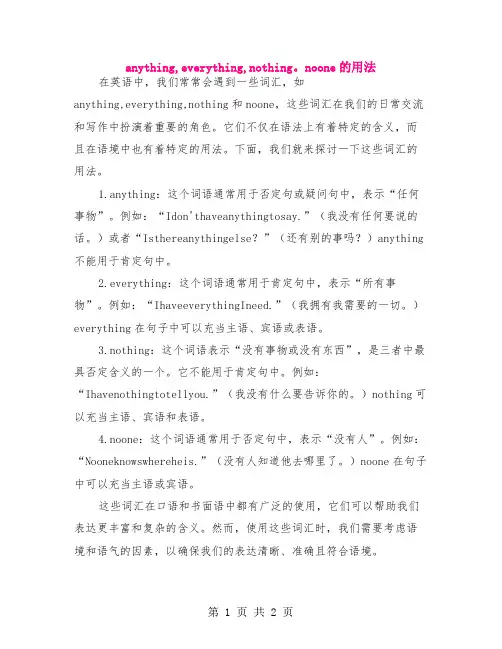
anything,everything,nothing。
noone的用法在英语中,我们常常会遇到一些词汇,如anything,everything,nothing和noone,这些词汇在我们的日常交流和写作中扮演着重要的角色。
它们不仅在语法上有着特定的含义,而且在语境中也有着特定的用法。
下面,我们就来探讨一下这些词汇的用法。
1.anything:这个词语通常用于否定句或疑问句中,表示“任何事物”。
例如:“Idon'thaveanythingtosay.”(我没有任何要说的话。
)或者“Isthereany thingelse?”(还有别的事吗?)anything不能用于肯定句中。
2.everything:这个词语通常用于肯定句中,表示“所有事物”。
例如:“IhaveeverythingIneed.”(我拥有我需要的一切。
)everything在句子中可以充当主语、宾语或表语。
3.nothing:这个词语表示“没有事物或没有东西”,是三者中最具否定含义的一个。
它不能用于肯定句中。
例如:“Ihavenothingtotellyou.”(我没有什么要告诉你的。
)nothing可以充当主语、宾语和表语。
4.noone:这个词语通常用于否定句中,表示“没有人”。
例如:“Nooneknowswhereheis.”(没有人知道他去哪里了。
)noone在句子中可以充当主语或宾语。
这些词汇在口语和书面语中都有广泛的使用,它们可以帮助我们表达更丰富和复杂的含义。
然而,使用这些词汇时,我们需要考虑语境和语气的因素,以确保我们的表达清晰、准确且符合语境。
总的来说,这些词汇的使用取决于我们的语境和目的。
我们需要根据具体的情境选择合适的词汇,以确保我们的表达能够准确地传达我们的意思。
无论是在口语还是书面语中,我们都应该尽可能地使用精确的词汇,以提高我们表达的清晰度和准确性。
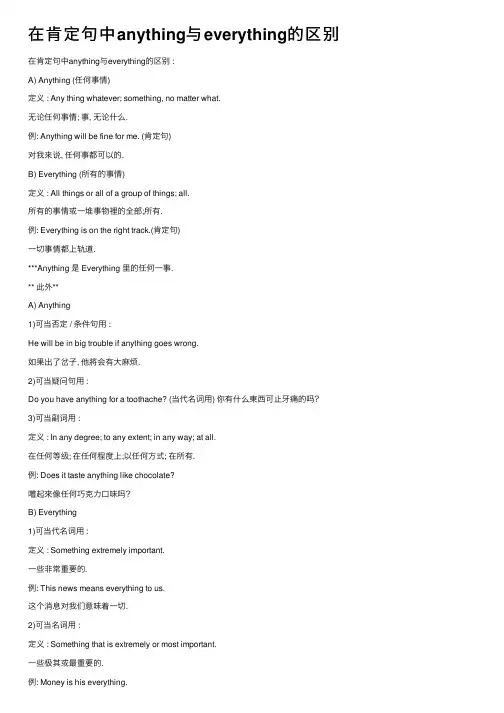
在肯定句中anything与everything的区别在肯定句中anything与everything的区别 :A) Anything (任何事情)定义 : Any thing whatever; something, no matter what.⽆论任何事情; 事, ⽆论什么.例: Anything will be fine for me. (肯定句)对我来说, 任何事都可以的.B) Everything (所有的事情)定义 : All things or all of a group of things; all.所有的事情或⼀堆事物裡的全部;所有.例: Everything is on the right track.(肯定句)⼀切事情都上轨道.***Anything 是 Everything ⾥的任何⼀事.** 此外**A) Anything1)可当否定 / 条件句⽤ :He will be in big trouble if anything goes wrong.如果出了岔⼦, 他將会有⼤⿇烦.2)可当疑问句⽤ :Do you have anything for a toothache? (当代名词⽤) 你有什么東西可⽌⽛痛的吗?3)可当副词⽤ :定义 : In any degree; to any extent; in any way; at all.在任何等级; 在任何程度上;以任何⽅式; 在所有.例: Does it taste anything like chocolate?嚐起來像任何巧克⼒⼝味吗?B) Everything1)可当代名词⽤ :定义 : Something extremely important.⼀些⾮常重要的.例: This news means everything to us.这个消息对我们意味着⼀切.2)可当名词⽤ :定义 : Something that is extremely or most important.⼀些极其或最重要的.例: Money is his everything.钱是他的⼀切.。
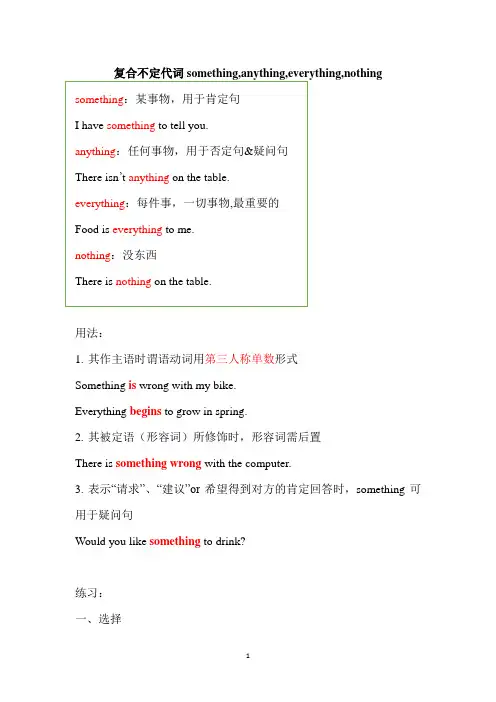
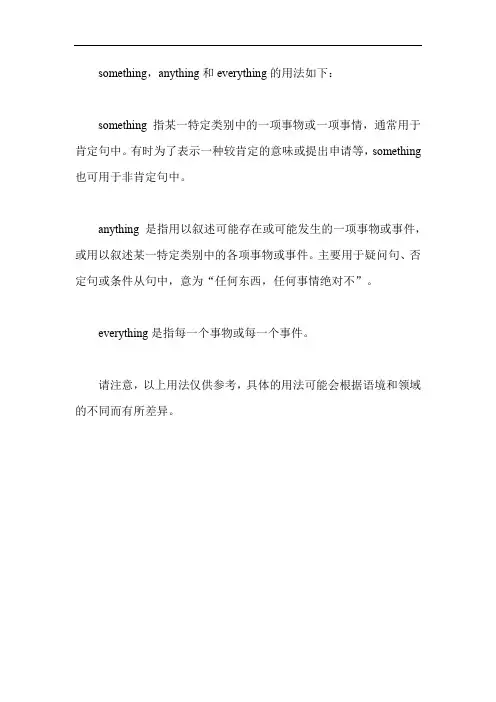
something,anything和everything的用法如下:
something指某一特定类别中的一项事物或一项事情,通常用于肯定句中。
有时为了表示一种较肯定的意味或提出申请等,something 也可用于非肯定句中。
anything是指用以叙述可能存在或可能发生的一项事物或事件,或用以叙述某一特定类别中的各项事物或事件。
主要用于疑问句、否定句或条件从句中,意为“任何东西,任何事情绝对不”。
everything是指每一个事物或每一个事件。
请注意,以上用法仅供参考,具体的用法可能会根据语境和领域的不同而有所差异。
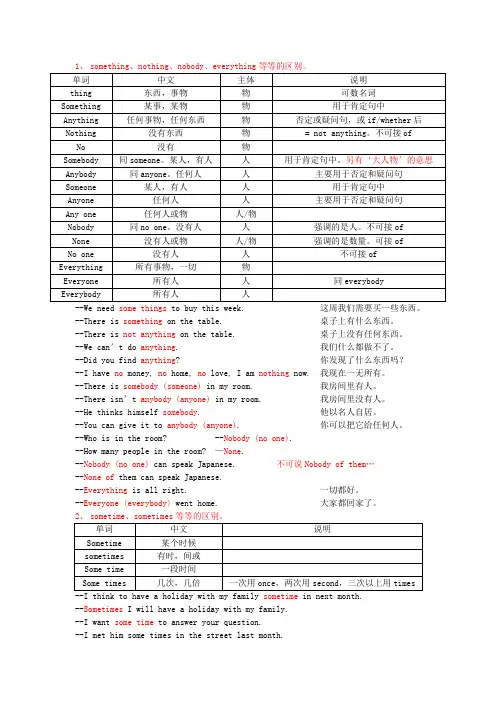
1、something、nothing、nobody、everything等等的区别。
--There is something on the table. 桌子上有什么东西。
--There is not anything on the table. 桌子上没有任何东西。
--We can’t do anything. 我们什么都做不了。
--Did you find anything? 你发现了什么东西吗?--I have no money, no home, no love, I am nothing now. 我现在一无所有。
--There is somebody (someone) in my room. 我房间里有人。
--There isn’t anybody (anyone) in my room. 我房间里没有人。
--He thinks himself somebody. 他以名人自居。
--You can give it to anybody (anyone). 你可以把它给任何人。
--Who is in the room? --Nobody (no one).--How many people in the room? —None.--Nobody(no one) can speak Japanese. 不可说Nobody of them…--None of them can speak Japanese.--Everything is all right. 一切都好。
--Everyone (everybody) went home. 大家都回家了。
2、sometime、sometimes等等的区别。
--I think to have a holiday with my family sometime in next month.--Sometimes I will have a holiday with my family.--I want some time to answer your question.--I met him some times in the street last month.。
主语和代词在人称和数方面要一致。
【错例】The question was so difficult that I couldn't answer them.【改正】改them为it。
因为question为单数。
【句意】这个问题很难,我不会回答它.【归纳】注意下列句子中主语与代词的一致:1) 其他人称+and I要与our,ourselves一致:He and I have done our homework.2) You and he(she) 要与your,yourselves一致:Can you and he express yourselves in English?3) something,anything,everything和nothing要与it一致:Nothing can be taken out of the room,can it?4) somebody,anybody,someone,anyone,everybody,everyone,nobody,no one,none一般要与he,his,himself一致。
如:Everybodyenjoyed himself very much.但在非正式英语中,也可以与复数代词取得一致。
如,Everybody knows what they ought to do.None of them can do the work,can they?Everybody looked after themselves。
5) those要与their一致;Those who haven't got their tickets before-handhave to wait in queues at the booking-office。
事先没有得到票的人必须在票房站队等候。
但those及其修饰部分用作呼语时,要与your一致:Those who are against the plan, please put up yourhands.反对这个计划的人请举手。
anything everything 的区别和用法anything 和 everything 是英语中的不定代词,它们在意义和用法上有着明显的区别:1. 区别- Anything:表示的是“任何事物”或“随便什么事情”,通常用在疑问句、否定句或条件句中表达不确定性或可能性。
在某些肯定句中使用时,它可以表达“任何可能的事物”,带有随意性或无特殊限制的意思。
示例:- Do you have anything to eat? (你有吃的吗?——疑问句)- I'll do anything for you. (我愿意为你做任何事。
——肯定句,表达强烈的意愿,没有任何事情不可以做)- She didn't tell me anything about her plans. (她没有告诉我关于她的任何计划。
——否定句)- Everything:表示的是“所有事物”或“每一件事”,强调的是整体性和全面性,一般用在肯定句中表达包含所有的情况。
示例:- She told me everything about her trip. (她把旅行的所有细节都告诉了我。
——肯定句)- Everything is ready for the party. (派对的一切都准备好了。
——肯定句)- I don't understand everything he said. (我没有理解他说的所有话。
——这里与否定词连用时,尽管形式上是肯定句,但表达的意思是“并非所有的话我都理解了”,属于部分否定)2. 特别注意- 当 everything 与否定词连用时,确实可以表达部分否定的概念,意味着不是所有的事物都符合描述,而至少有一部分不符合。
- anything 在正式语境下有时也可以用于肯定句,尤其在条件状语从句和让步状语从句中,如:“If you want anything, just ask.” (如果你想要什么,尽管问就好。
用something定语从句
用something定语从句
用something定语从句
▲对于这个问题,语法书一般是这样说的:语法书一般会这样说:当先行词为something, anything, everything等不定代词时,其后的定语从句时通常用关系代词that来引导(注意“通常”二字)。
事实上,something, anything, everything后接都可接which引导的定语从句,尤其是something比另外两词确实更是如此,但从使用的普遍性来看,自然还是用that远比用which的多。
▲这个问题《牛津用法指南》(第2版)在第474节有如下说明:在数量词all, every (thing),some (thing),any (thing),no (thing),none, little, few, much, only的后面以及最高级的`后面,尤其常用that。
Is this all that’s left?是不是就剩下这个了? (比…al l which is left?更为自然。
)
Have you got anything that belongs to me?你那儿有我的东西吗? (比...anything which...更为自然。
)
很显然,《牛津英语用法指南》没有认为在something, anything, everything后接which引导的定语从句是“错句”,而只是认为用that比用which“更为自然”。
▲正因为这样用的用法“不够自然”,所以,正如曾老师所说,初学者应“慎用”。
【用something定语从句】。
everything, something, anything , nothing 均为指物的复合不定代词,它们作主语时,谓语动词常用单数形式
everything 意为每件事;一切事,可用于肯定句、疑问句或否定句中。
如:
①I hope everything goes well. 我希望一切顺利。
②Who can know everything? 谁能知道万事万物呢?
something意为某事;某物,常用于肯定句中,也可用于征求对方意见的疑问句中。
如:
①Something is wrong with my ears. 我的耳朵有点毛病。
②Jim, could you do something for me, please? 吉姆,请为我做点事好吗?
anything 意为某事一些事,一般用于否定句或疑问句中。
如:
①Can you hear anything? 你能听到某种声音吗?
②You mustn't eat anything until you see the doctor. 在看医生之前不许吃任何东西。
意为任何事用于肯定句中。
如:
You can ask me anything you want to know.
nothing意为没有什么;没有东西。
如:
Tom saw nothing. 汤姆什么也没看见
nothing=not anything
everything 最重要的. Money is everything to him.金钱对他比什么都重要。
A something
B anything
C nothing
D everything
1 I want to do __________.我想做点什么事。
2 There is _________ in the box.盒子里有一些东西。
3 There isn’t _____________ in the box.
4 Is there ____________ in the box?
5 Are you doing ___________?
6 I had ____________ to do.我没有事情做。
7 He stole __________ except for this.
他偷了除了这个的任何东西。
9 She`s beautiful,I agree,but beauty is not __________.我同意她是美丽的,但美并不是最重要的。
10 Would you like ___________ more?
11 I know ___________ about it.我对此事一无所知。
12 I don’t know ____________about it.
13 This shop sells ___________ needed for camping. 这家商店出售一切露营用具。
14 Tell me ____________about it. 告诉我这件事情的始末。